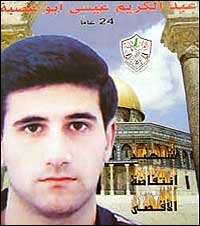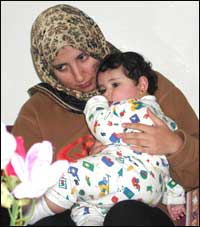The Roadblocks to Freedom in the Occupied Territories
Editor's Note: The following is one report in a several part series on the situation in the Qalandiya refugee camp in the Occupied Territories.
It was 4:30 p.m. on Friday, March 2, and Abdel Kareem Abu Assabeh was returning to his home in the Qalandiya refugee camp on the West Bank. Kareem had just bought a loaf of bread for his eight-month-old daughter. Unknown to him, Israeli soldiers had entered the camp for the first time in half a year, in pursuit of stone-throwing teenagers. They found none. Just as Abu Assabeh, 24, a carpenter, reached out his hand to unlatch the gate to his home, he convulsed and dropped to the ground. According to eyewitnesses in the camp, an Israeli army sniper lurking behind a wall 200 yards away, had fired a bullet into Abu Assabeh, piercing his back and perforating his lungs. An hour later, he was pronounced dead at Ramallah State Hospital with the bullet still lodged in his chest.
In the week before Assabeh's death, four Palestinians have been killed in skirmishes with soldiers, notes B'Tselem, an Israeli human rights group.

Poster of Abdel Kareem Abu Assabeh |
Abu Assabeh instantly became a "shaheed," a martyr. Countless posters of his face were pasted on the walls in Qalandiya camp, which straddles the main highway between Jerusalem and Ramallah. Technically, Qalandiya falls within "Area C," a zone established by negotiation between Palestinians and Israeli officials. Area C is assigned to total Israeli control.
Married two years ago, Abu Assabeh is survived by his eight-month-old daughter, Hadeel, and 22-year-old wife, Laura. "He didn't throw any stones, he was in our house near the gate!" cries Munir Abu Assabeh, Kareem's 28-year-old brother. "He was in a shop getting some bread for his daughter, then near the gate [of his home] they shot him," adds Munir, who teaches social studies to 7th and 8th graders at a school in Be'er Sheva in the Negev. "You don't feel comfortable in your life."
Comfort and security are unattainable cliches for the people in the twin Palestinian cities of al-Bireh and Ramallah. The sizzling tension between the Palestinians and the Israeli reserve soldiers stationed to man the road- blocks along the highway, and to protect the 1,000 Jewish settlers in the Psagot settlement adjoining Ramallah, upsets people like Munir who are uninvolved in the daily conflict.

Assabeh's wife, Laura, and daughter, Hadeel, in Qalandiya
|
According to B'Tselem, since the start of the Aqsa intifadeh in late September, 357 Palestinian and 62 Israeli lives have been lost in the skirmishes, assassinations and extra-judicial killings in the occupied territories of the West Bank and the Gaza Strip.
In Ramallah alone, on the West Bank, 45 Palestinians including nine security force personnel, and nine Israelis, among them four soldiers, have been killed according to LAW, a Palestinian human rights group, which fights rights abuses by both Israeli and Palestinian Authority forces. The Israeli Defense Forces blame the Palestinians for firing on Psagot and accuse Force 17, the elite branch among the Palestinian security forces in Ramallah, of masterminding bomb attacks within Israel; while the Palestinians question the Israeli legitimacy on the West Bank.
Munir Abu Assabeh says that it is futile to either register a police complaint or haul his brother's assassin to a court of justice. When asked why he hasn't approached the authorities, he says, "You are not going to get anything out of it." Besides the human rights organizations that document deaths and petition authorities for redress on behalf of the victim's families, official institutions do little to safeguard the refugees themselves or their property. But this state of affairs is not restricted to the camp.
__________________________________________________
Vikram Sura is a New York-based freelance journalist. He had an opportunity to report from the Palestinian territories this March while traveling there as a student of the Columbia Journalism School.

















